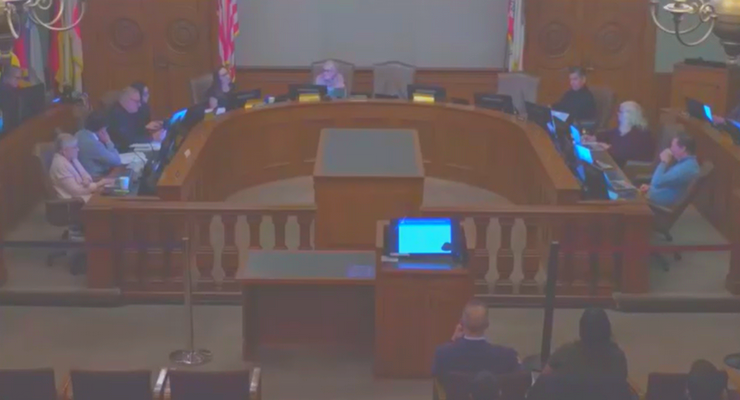
Pete Ewing, West Pasadena Residents Association President. [Robert Reiter photo]

Mayor Victor Gordo addresses the WPRA annual meeting. [Robert Reiter photo]

City Manager Miguel Márquez and Claire Bogaard. [Robert Reiter photo]

Congresswoman Judy Chu with WPRA Treasurer Blaine Cavena. [Robert Reiter photo]

WPRA Board Member Mic Hansen, Teresa Lamb Simpson, and Dominick Correy. [Robert Reiter photo]

State Senator Anthony Portantino [Robert Reiter photo]

WPRA Board Member Mic Hansen [Robert Reiter photo]

Congresswoman Judy Chu [Robert Reiter photo]

Pasadena School Board Member Yarma Velázquez and Pasadena Media CEO George Falardeau [Robert Reiter photo]
The West Pasadena Residents Association (WPRA) held its 62nd annual meeting on Thursday at the newly renovated Elks Lodge, bringing together nearly 300 local residents, organizations, and leaders to discuss the future of the 50-acre 710 Freeway corridor. The theme of the meeting, “Reconnecting Pasadena: Mobility, Transportation, and Opportunity in the 710 Corridor,” focused on generating ideas and inspiration for transforming the site.
Mayor Victor Gordo, alongside U.S. Congresswoman Judy Chu, State Senator Anthony Portantino, Vice Mayor Steve Madison, City Manager Miguel Márquez, and Fire Chief Chad Augustin, pledged to move swiftly through the conception, design, and construction process, which experts project could take at least a decade.
“The relinquishment has been such an important step,” Mayor Gordo said, emphasizing the need to “stitch our city together” while considering the site’s role as a gateway to various parts of Pasadena.
Congresswoman Chu highlighted federal funding she secured for several key initiatives in Pasadena, including the 710 Stub renovation project.
“I was proud to vote for the bipartisan infrastructure law and then to work to advocate for $2 million grant from that law for this redevelopment,” Chu told the WPRA members.
“And guess what? This past fall in 2023, it was granted. So the funding will aid a three-year planning process to re-envision and reconnect the 710 stub area, addressing transportation and land use needs, fostering community restoration, enhanced connectivity and support affordable transportation options such as bike and walking trails and public transit,” Chu explained.
Senator Portantino discussed the passage of Senate Bill 7 — which he authored — that allowed nonprofits in the 710 Corridor to purchase their properties below fair market value. Portantino also mentioned his staff’s efforts in working with the Governor’s office to make this happen, saving the nonprofits millions of dollars.
Livable transportation engineer Ian Lockwood from Toole Design delivered the keynote presentation, emphasizing that cities that removed highways from the urban equation created better, safer, and more workable cities.
“Cities were never intended to be designed around cars. They were designed to be around people,” Lockwood said, encouraging the City to think about local neighborhoods with local traffic patterns and to avoid the idea of another major highway.
Lockwood explained that the modernist idea of speeding up roads and streets to spread out the value of downtown areas was incorrect.
“It didn’t spread out the value. It exported it from the city to the edges of the suburbs, and the streets that were sped up and widened for motorists became barriers. It started to harm businesses,” he said.
Charles Loveman, Executive Director of Heritage Housing Partners, spoke about the work of the 710 Advisory Task Force, which was appointed last year as a 16-person committee focused on data collection and working with the Master Plan consultant, Perkins and Eastman.
Loveman posed questions about what should be built in the “ditch,” highlighting the need for adaptable buildings and the importance of creating a special place where everyone in Pasadena would want to congregate.
He also emphasized the need for new middle-income ownership housing, saying, “Public policy should not ignore the middle class, which we have been doing for a long, long time.”
WPRA President Pete Ewing urged members to get involved in the process and assert the position of West Pasadena.
“What we’re concerned about is West Pasadena has gotten destroyed over 60 years of Caltrans neglect, and it’s time for a fix,” Ewing said, emphasizing the need to rehabilitate the area and develop a world-class project for the entire city to use.
He expressed concern about the City controlling the information about the Stub.
“One of the issues, though, is the City controls the communication process, and generally speaking, my experience has been if you control the process, you control the outcome.”
Due to time constraints, the WPRA decided to post questions and responses from the meeting on their website (www.wpra.net) to ensure that all attendees’ concerns and ideas are addressed comprehensively.














 35 comments
35 comments


